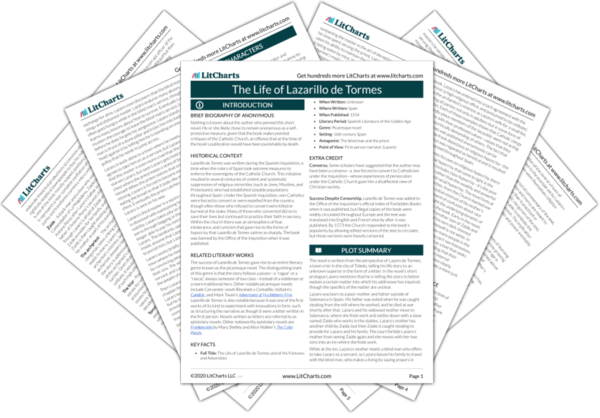Lazarillo de Tormes was a unique book at the time of its publication because it portrayed the world realistically through the eyes of a poor boy rather than a nobleman or a more conventional hero. The book’s frank depiction of how crime and violence are interwoven into the fabric of the lives of poor people was shocking to the Spanish readership of the 16th century. Ultimately, the author represents the crimes committed by the poor as victimless crimes, committed out of necessity, while the conditions in which poor people live and the punishments they are served for their crimes are treated by the author as the more reprehensible violence, inflicted by those in power against those without.
All around Lazaro, the poor and low-born are subject to violence, either by being forced into danger in service of the rich, or by the rich punishing them directly. Lazaro himself is frequently subjected to brutal violence at the hands of the masters he serves, often with no real recourse but to continue serving them until an opportunity for escape presents itself. He moves from one master to the next, hoping that the pain he has to endure will be less. Despite all this, extreme hunger is perhaps the greatest source of suffering for Lazaro. The pain of hunger seems to be deliberately inflicted on Lazaro by his masters, making it the violence that characterizes his life story more than any other.
In many instances Lazaro retaliates with violence or theft against the masters that abuse him, but these acts of violence are presented as justified. For example, Lazaro steals systematically from the blind man because the blind man deprives Lazaro of a fair share of the spoils that Lazaro helps to bring in. Lazaro injures the blind man on several occasions—finally perhaps mortally—but he feels no remorse. Lazaro also steals from the priest’s chest of bread, feeling he has no choice if he hopes to survive, since the priest starves him.
Over the course of the text, distinctions become blurred between cruel and arbitrary violence against the weak, violence as punishment for crime, and retaliatory violence. But by regularly treating the crimes of the powerless against those in power as justified, the author portrays poverty itself as a violence inflicted by those in power against those without. As a vivid depiction of class inequality, the book seems to encourage—sometimes explicitly—a total upheaval of the social order by means of violent rebellion.
Poverty, Crime, and Violence ThemeTracker

Poverty, Crime, and Violence Quotes in The Life of Lazarillo de Tormes
It seemed to me that at that moment I awoke out of the simplicity in which I had remained like a sleeping child. And I said to myself, “He’s right. I’d better keep my eyes open and my wits about me, for I’m on my own, and I’ll have to figure out how to manage for myself.”

Unlock explanations and citation info for this and every other The Life of Lazarillo de Tormes quote.
Plus so much more...
Get LitCharts A+He put wine on the places where he’d cut my face with the broken jug, and he smiled and said, “What do you think of that, Lazaro? The same thing that got you hurt heals you afterwards and gets you back into shape.”
“Honestly, I waste more wine washing this boy in one year than I drink myself in two. Lazaro, to put it at its very least you owe more to wine than you do to your own father. He only gave you your being once, whereas wine has brought you to life a thousand times. … I’ll tell you, if there’s anyone in this world to whom wine will be a blessing, it will be you.”
When they tried this out the first time, I must admit to my shame that I was frightened by it like most of the others, and thought it was just what it appeared to be. But afterwards, when I saw how my master and the constable laughed over the affair and made fun of it, I realized that it had all been worked out by my industrious and inventive master.











